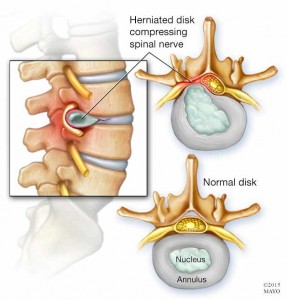-
Mayo Clinic Q and A: Herniated disk symptoms often effectively treated without surgery
 DEAR MAYO CLINIC: What is the typical treatment and recovery time for a herniated disk? At what point should surgery be considered?
DEAR MAYO CLINIC: What is the typical treatment and recovery time for a herniated disk? At what point should surgery be considered?
ANSWER: In many cases, pain and other symptoms caused by a herniated disk resolve with time and self-care measures. When medical treatment is required, therapy that doesn’t involve surgery often is all that’s needed to effectively treat herniated disk symptoms. However, if your symptoms significantly limit your day-to-day activities, if you have nerve damage due to a herniated disk, or if your symptoms cannot be controlled with other treatment, then spine surgery may be necessary.
Your spinal disks are the cushions between the individual bones, called vertebrae, that make up your spine. The disks have a soft center within a tougher exterior. A herniated disk happens when some of the center pushes out through a crack in the outer portion of the disk. A herniated disk may irritate or compress a nearby spinal nerve root. The result can be back pain, along with pain, numbness or weakness in an arm or leg.
For most people who develop back pain — whether it is because of a herniated disk or due to another problem — symptoms often go away within six to eight weeks. During that time, you can take steps to ease discomfort. Rest, apply heat or ice to the painful area, and take over-the-counter pain medication, such as ibuprofen or acetaminophen, if you need it. If you have muscle spasms, taking a muscle relaxant also can be useful. If pain is strong, ask your doctor about getting a short-term prescription pain medication.
There are some red flags to watch for when you have back pain. Symptoms that should prompt a call to your doctor right away include developing a fever, chills, flu-like symptoms or a rash when your back symptoms start. You should also contact your doctor if you have significant or progressive weakness. If you develop significant bowel or bladder function changes, which are often associated with pain or numbness in the area around your rectum or genitals, have those symptoms evaluated as soon as possible.
If you notice back pain and your immune system is suppressed for any reason, you have a history of cancer, you have unexplained weight loss associated with your back pain, or the beginning of the back pain was related to trauma, contact your doctor.
When symptoms lasts longer than eight weeks — or if you have any of the red flags mentioned earlier — see your doctor for an evaluation to investigate the underlying cause. Such an evaluation typically includes a magnetic resonance imaging, or MRI, exam of the spine and sometimes an electromyogram, or EMG. An EMG can show if any nerve roots have been damaged.
If tests reveal a herniated disk but no nerves are damaged and you do not have significant weakness or bladder or bowel problems, then medication, physical therapy and, in some cases, steroid injections typically are recommended. If pain and other symptoms can be adequately managed with those measures, they can be continued for as long as necessary.
Surgery for a herniated disk would be considered if there is nerve damage, if pain and other symptoms are so severe that they interfere with daily activities, or if non-surgical treatment is not effective. Surgery often can resolve herniated disk symptoms more quickly than other treatments. In general, though, when there is no nerve damage, the long-term outcome for surgical and non-surgical treatment is the same when measured two years after symptoms begin.
Fortunately, most people with a herniated disk never get to the point that they need to see a specialist or have advanced testing. Back symptoms usually go away on their own. Even for those who do need treatment, only a small minority has lingering chronic pain that does not resolve over time. — James Watson, M.D., Neurology, Mayo Clinic, Rochester, Minn.







